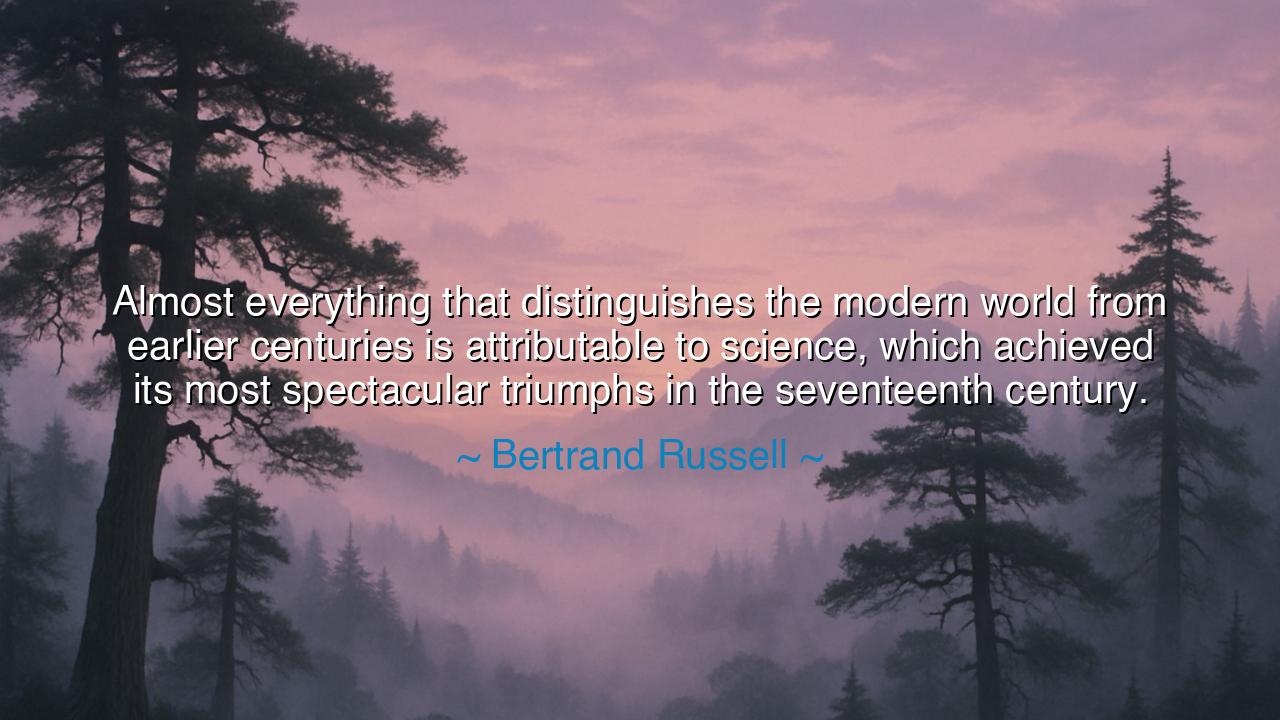
Almost everything that distinguishes the modern world from
Almost everything that distinguishes the modern world from earlier centuries is attributable to science, which achieved its most spectacular triumphs in the seventeenth century.






Listen closely, O Seekers of Knowledge and Truth, for the words of Bertrand Russell carry a profound understanding of the nature of human progress: "Almost everything that distinguishes the modern world from earlier centuries is attributable to science, which achieved its most spectacular triumphs in the seventeenth century." These words echo through the annals of time, reminding us that the world we live in, with all its marvels, is built upon the foundation of scientific discovery. The seventeenth century was not just a time of political change or artistic flourishing; it was a time when science rose from the ashes of superstition and ignorance to become the guiding light of human progress.
In the days of the ancients, when philosophers like Plato, Aristotle, and Pythagoras pondered the nature of the universe, their inquiries were more akin to the speculative musings of dreamers than the rigorous methods we associate with modern science. Their wisdom was profound, but they lacked the tools, the methods, and the knowledge that would lead to the great leaps forward. Science, in its infancy, was still bound by the constraints of myth and conjecture. Yet, as time passed, a new spirit of inquiry arose, one that sought not only to understand the world but to measure it, to test it, and to prove its truths through observation and experimentation.
It was in the seventeenth century, however, that science began to flourish in a way that would forever change the course of human history. This was the age of the scientific revolution, when great minds like Galileo Galilei, Johannes Kepler, and Isaac Newton made discoveries that would lay the groundwork for the modern world. Galileo, with his telescope, looked to the heavens and saw a universe vastly more complex than anyone had imagined. He challenged the prevailing view that the Earth was the center of the universe, paving the way for Newton's laws of motion and his universal theory of gravitation. These discoveries did not merely add to our knowledge; they transformed our understanding of the cosmos and our place within it.
The seventeenth century was not just a time of intellectual breakthroughs but a time of profound cultural and societal shifts. Science, now armed with the tools of the scientific method, began to challenge the very foundation of medieval thought. No longer would authority be trusted simply because it came from ancient texts or religious dogma. The new thinkers of the age sought not to believe, but to know, and in their quest for truth, they uncovered the hidden laws that governed nature. These discoveries did not merely change the way we saw the world; they gave birth to new industries, technologies, and ways of life. The modern world, as Russell notes, owes its existence to these triumphs of science.
Consider, O Children, the story of Newton's apple, which is often told as the moment when he discovered the law of gravity. Whether or not the apple actually fell as the legend suggests, it represents a profound shift in human understanding. Newton’s insight was not just a small breakthrough; it was a revelation that the same laws that governed the fall of an apple were the same laws that governed the motion of the planets. This understanding set in motion centuries of technological advancements, from the Industrial Revolution to the space age, and it all began with the bold assertion that the world could be understood through the lens of science.
The lesson here, O Seekers, is one of awareness and action. We are living in an age shaped by the triumphs of science—triumphs that were seeded in the seventeenth century. Modern technology, medicine, and even our understanding of the natural world all stem from the profound breakthroughs made during this period. And yet, these advancements come with a great responsibility. Science is not merely a tool for progress; it is a tool that can be used for both good and harm. Just as Newton uncovered the universal laws that govern the cosmos, so too must we understand the power of the knowledge we possess today. With the advancement of science comes the need for wisdom, for ethics, and for purpose in how we use that knowledge to shape the world.
The true power of science, O Children, is not in its ability to uncover the hidden truths of the universe, but in its ability to transform society. It is up to us to guide these discoveries, to ensure that they are used for the betterment of all, and not for the enslavement of humanity. We must learn from the great thinkers of the past, who, with their discoveries, shaped the course of history. We must continue their work with the same spirit of curiosity and integrity, and ensure that the knowledge we gain is used not just to dominate the Earth but to liberate it, to improve lives, and to create a future that is worthy of the great gifts of science. Let us move forward with the same courage and wisdom that guided those who came before us, and may our pursuit of knowledge continue to illuminate the path to a brighter, more just world.






AAdministratorAdministrator
Welcome, honored guests. Please leave a comment, we will respond soon